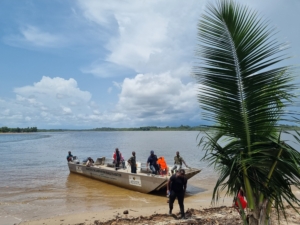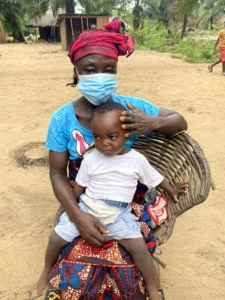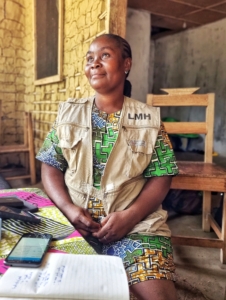When Marie Gboto went to wake her son Samuel, she quickly realized something was wrong. He was burning with a fever and soon after began vomiting, two danger signs for a 17-month-old. Even more concerning was the reality that the nearest health center was across the river from her community in Liberia’s remote Rivercess County. From Marie’s home in Nyanee District, the journey can take up to two days and requires payment not all families can afford.
Marie breathed a sigh of relief when she remembered her neighbor Laura Gbee could provide care right in their own community. She rushed Samuel to Laura right away.
Laura is a community health worker trained by the Government of Liberia and Last Mile Health as part of the country’s National Community Health Assistant Program. She delivers primary health services directly in her community, including diagnosing and treating malaria, identifying malnutrition in children, and providing prenatal care to pregnant women. She is coached and mentored by a trained nurse, and together they can refer patients who need advanced care to the nearest facility and coordinate their travel. Laura is paid a monthly salary for her work.
When Marie and Samuel arrived, Laura assessed Samuel’s symptoms and decided to test him for malaria. She pricked Samuel’s finger for a blood sample using a rapid diagnostic test: an antigen test that allows community health workers to diagnose malaria quickly without traditional laboratory techniques or equipment. Within 20 minutes, Laura diagnosed Samuel with malaria. She prescribed 50mg of Artemisinin-based combination therapy for malaria and paracetamol for fever. She also advised that he sleeps under a mosquito net at all times, an important method of prevention as this was his third bout with malaria.
“I heard there was a small doctor in the community who treated children with pneumonia, malaria, and diarrhea,” Marie explains. “Laura takes good care of people and encourages us. She gives us medicine, and the kids get better before the medicine runs out, and we don’t have to cross the river for anything.”
Malaria is a major health issue in Liberia, especially among children and in rural communities like Nyanee District, where stagnant water, dirt piles, and bushes serve as mosquito breeding grounds. Marie says that before the community health workers were trained in Nyanee District, many children used to die from malaria. She is grateful that the situation has changed, and that her own son was treated. She was also impressed by the follow-up check-ups Laura conducted until Samuel recovered.

In Nyanee District, community members must cross the river on a boat like this one to reach the nearest health center
Samuel’s story aligns with encouraging trends Last Mile Health has captured across Rivercess County. In 2021, 91% of children under the age of five who had a fever received a rapid diagnostic test for malaria–compared to only 43% in 2015, before the National Community Health Assistant Program was launched. And among children who tested positive for malaria, the percentage receiving appropriate treatment rose from 82% to 93%. Investment in community health workers like Laura means her neighbors can continue to access the care they need, right at their doorsteps.
Treating children like Samuel and seeing how well he is doing is what motivates Laura to continue her essential work. “I’m pleased with myself. People in my community admire me,” says Laura. “I treat their kids, and they get better, and the medicine works.”






